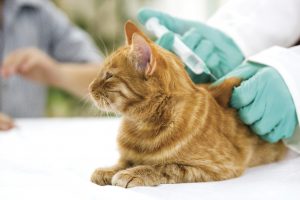Posts Tagged ‘flea and tick prevention’
How to Choose the Right Flea and Tick Medicine for Your Dog
 With the weather being nice, people and pets are tired about being cooped up inside. They are starting to enjoy the fresh air, the calm breezes in their face and the warmth of the sun. But whether it is a walk in the park, a weekend camping along the lake or even lounging around your front yard, fleas and ticks could be waiting to latch onto your pet and hitch a ride. So because of this, application of a flea and tick control or collar is essential to prevent them from infesting your home.
With the weather being nice, people and pets are tired about being cooped up inside. They are starting to enjoy the fresh air, the calm breezes in their face and the warmth of the sun. But whether it is a walk in the park, a weekend camping along the lake or even lounging around your front yard, fleas and ticks could be waiting to latch onto your pet and hitch a ride. So because of this, application of a flea and tick control or collar is essential to prevent them from infesting your home.
There are many factors to consider when choosing the optimal product. One must decide if they want a collar, topical or chewable tablet. Each one has their pro’s and con’s about them. The collars and topical products such as Frontline or Advantage have been around a lot longer and may be less expensive to buy, but we have seen breaks in protection because the fleas and ticks have gained resistance or the product has not been used properly. Some of those products are approved by the EPA so they might not be safe to use on your pet. Recently new products such as Nexguard or Bravecto have been developed that are taken orally. Because they are newer products, the fleas and ticks have not developed a resistance to them. Also since they are ingested, they are approved by the FDA to assure their safety to the pet.
There are several oral products available like Simperica Trio that will also control other parasites, along with fleas and ticks. So they may be more expensive but be more convenient in the long run.
The best thing to do is to have a conversation with your vet about what is best for your pet, as well as what works for you financially. We are happy to have a conversation about any concerns you have. Prevention is key, so make sure to protect your furry companion this summer. Contact our offices today!
Everything You Ever Wanted To Know About Pet Vaccines
 Pet vaccines are important, and they have a long history. Probably the most important technological gains were discovered in the 1790’s by Dr. Edward Jenner. He discovered the first vaccination by giving people a preparation of material from cowpox, which was a common animal disease in cattle. The people that were injected with or “vaccinated” with the material did not get sick and remained healthy when they were exposed to the deadly smallpox virus. Over 100 years later, a French scientist by the name of Louis Pastuer, found that they could protect people and animals from disease by injecting altered forms of microorganisms.
Pet vaccines are important, and they have a long history. Probably the most important technological gains were discovered in the 1790’s by Dr. Edward Jenner. He discovered the first vaccination by giving people a preparation of material from cowpox, which was a common animal disease in cattle. The people that were injected with or “vaccinated” with the material did not get sick and remained healthy when they were exposed to the deadly smallpox virus. Over 100 years later, a French scientist by the name of Louis Pastuer, found that they could protect people and animals from disease by injecting altered forms of microorganisms.
The process of how a vaccine works is a complex reaction that involves many chemical and cellular reactions within and between the immune system cells of the body. Basically the role of the vaccine is to expose the immune system of the pet to viral and bacterial antigens that are contained in the vaccine. In the future, when the pet is exposed to that related organism, the body will recognize it and then activate the immune system to prevent the disease from producing or reducing the signs of clinical disease.
Vaccines can be administered by subcutaneous or intramuscular injections, intranasal or orally. The vaccines that are injected or given orally tend to produce a more systemic or whole body response, whereas the intranasal provides a more local response. Intranasal vaccines can be advantageous to provide a quicker response and prevent or kill the new virus before it can get any further in the body. Local nasal vaccines would not be helpful for a virus that has been ingested and causes intestinal disease such as parvovirus in dogs. For that we would want a vaccine that would produce a more systemic response.
The vaccines that we use in veterinary medicine are most generally either a killed or a modified live (attenuated) vaccine. There are multiple indications for both, but generally speaking the killed vaccines are safer and unlikely to cause disease in the immunocompromised pet. Whereas, the live vaccines provide a more amplified response that leads to a better, longer lasting immune protection. Several of the vaccines that we use have many different viruses in one injection. This allows to vaccinate for several of the organisms in one injection.
To confuse you even more, pets get some protection through the placenta when the puppies and kittens are in the mother’s uterus and when they get colostrum which is the first milk that they drink. This protection will decrease over time and usually will be low enough by 12 weeks of age where vaccinations will start reacting. There is no way to measure quick, easy and inexpensive way to measure the immunity gained here, so we generally recommend starting vaccines at 6 to 8 weeks of age and then booster them every 2 to 4 weeks until they are 16 weeks of age. Generally, it is not the number of vaccinations that they get, but when they get them at their chronological age.
A vaccine helps prime an animal against a specific disease. It does this by stimulating the immune system with a nonpathogenic virus or bacteria. If the animal responds adequately, it will develop cells that will help it to quickly and efficiently fight off the pathogenic form of the agent if it is encountered later. Here at Olsen Veterinary Clinic, we have tailored our vaccination programs to meet the needs of your pet. If you have any questions please feel free to contact us here, or call our office at 618-656-5868.
Summer Dangers For Pets
 Oh the dog days of summer. What’s not to like about summer? Vacations, cookouts, swimming—can it get any better than that? Wait a dog gone minute though. These fun times can be hazardous to your pets, so care must be taken to make sure that they don’t succumb to the dangers that can be lurking. Accidents can happen almost anytime and anyplace so it is important to be aware of how to prevent them from happening. These can include but not be limited to heat stroke, swimming pools, venomous pests, campouts, bbq and other foods just to name a few. So let’s cover a few dangers to avoid and try to prevent.
Oh the dog days of summer. What’s not to like about summer? Vacations, cookouts, swimming—can it get any better than that? Wait a dog gone minute though. These fun times can be hazardous to your pets, so care must be taken to make sure that they don’t succumb to the dangers that can be lurking. Accidents can happen almost anytime and anyplace so it is important to be aware of how to prevent them from happening. These can include but not be limited to heat stroke, swimming pools, venomous pests, campouts, bbq and other foods just to name a few. So let’s cover a few dangers to avoid and try to prevent.
Summer Heat
The summer heat can be dangerous to our pets. Dogs are covered with hair, have very few sweat glands, and some breeds have shortened noses that make it tough to keep cool in the summer. So the easiest way to beat the heat is to adjust your walking schedule to the morning hours when it is cooler out. Some dogs may do well with having their haircoat shaved, however breeds like the Husky have a haircoat that also helps keep them cool in the summer.
The heat will also warm up the inside of your car, so if it is above 65 degrees either leave your pet at home or take it inside with you when you leave the vehicle.
Sunburn can also cause some problems, so it may be important to put sunscreen on the pets ears and bare skin to prevent this.
Swimming Pools
What is a better way to beat the heat than swim in a swimming pool? It is great and it also is a good way for your dog to get exercise. Floatation devices are available to assist the pets that are not strong swimmers. But, do not leave them unsupervised. It is important that they be taught how to exit the pool safely before they tire. Also having fresh water for them to cool off with and to remove the chlorine, salt and bacteria that can be harmful to them is beneficial. So keep a bowl handy by the pool.
Fireworks
Almost everyone celebrates the Fourth of July with fireworks. Dogs tend to not like loud noises and can be scared easily. The best advice would be to leave your pets at home inside and away from the flash of the fireworks.
BBQs
Some summer evenings are spent socializing with friends and barbecuing. We all like them, and even our pets are hoping for a few table scraps. A little of this and a little of that can be bad for pets—and not just their waistlines. Some surprising foods like grapes, onions, garlic and raisins, can be toxic to dogs if consumed in large quantities and should stay off their menu. Other barbecue staples like corn on the cob, bones, fruit with pits, skewers or ice cream can be dangerous to our four-legged family members. It may be helpful to talk to guests and children before summer parties and politely remind them that table food could be detrimental to the health of your pet.
Fleas & Ticks
While our the heat puts a strain on our pets, fleas and ticks thrive during this time. They can cause disease and carry other parasites that are detrimental to the health of our pets. Just like humans, pets can have allergic reactions to insect and spider bites. By grooming your pet frequently, you can check for the presence of the pests, hot spots, and other skin problems that can be caused by these pests. There are some very good flea and tick medications out there to prevent the problems before they start, so talk with your veterinarian to see what they would suggest. You can also order directly from our store.
Heartworms
Heartworms are carried by mosquitos, and the summer months are when mosquitos thrive and pose the greatest threat to your pet. The heartworms can be very dangerous to the health of your pet. It is best to have your pet on a medication to prevent your pet from contracting the painful disease. So ask your veterinarian for their recommendations.
These dangers may sound scary, but a little preparation and watchful eye is all you need to take the heat off your summer. If you have any questions, please don’t hesitate to call the Olsen Veterinary Clinic at 618-656-5868, or contact us here.
Parasite Prevention And Your Pet
 Parasite prevention and your pet is something very important. With summer fast approaching, pet owners are more active with their pets outside. That is where you will find parasites that can infest your pets, several of which can infect people as well. So because of this, parasite prevention is not only important for the health of your pet but also for the health of your family.
Parasite prevention and your pet is something very important. With summer fast approaching, pet owners are more active with their pets outside. That is where you will find parasites that can infest your pets, several of which can infect people as well. So because of this, parasite prevention is not only important for the health of your pet but also for the health of your family.
As a veterinarian, we generally talk about controlling and preventing four major parasite groups—Fleas and Ticks, Intestinal Parasites, and Heartworms.
Fleas and Ticks
Fleas and ticks are troublesome parasites of the skin. Not only are they troublesome because they cause problems with the skin, they also transmit several diseases to your pet. There are many effective products out there that can be purchased from your veterinarian to control and prevent flea and tick infestations. Regular use of these products can prevent fleas and ticks from becoming a problem to your pet. As tempting as it might be to purchase an over the counter product from your pet store or big box store, I would caution you as a pet owner to be very careful. Many of these products can have serious side effects if used improperly and may have limited effectiveness.
Intestinal Parasites
Intestinal parasites can cause pets to vomit, have diarrhea, lose weight, and lead to a poor overall condition of your pet. The most common intestinal parasites in cats and dogs are roundworms, hookworms, whipworms, tapeworms and coccidia. All of these parasites can have the ability to affect your pet. Additionally, some roundworms, hookworms, and some tapeworms can also affect humans. Because of this, pet owners should contact their veterinarian to check on a routine testing schedule and monthly preventatives.
Most parasites cannot be seen with the naked eye in the feces. Your veterinarian can diagnose the infestation by taking a sample of the feces and looking at it under a microscope. The Companion Animal Parasite Council recommends that a fecal analysis be performed 2 to 4 times during a pets first year of life and at least 1 to 2 times per year for adults.
Because your pet can get exposed to intestinal parasites at birth and an early age of life, the CAPC recommends that puppies and kittens should be dewormed every 2 to 3 weeks until they are 12 weeks old and animals that are older should be dewormed at least twice. Once the initial deworming is complete, dogs and cats should be put on a monthly, year-round product that prevents intestinal parasites as well as heartworm infections.
The area where your pet eliminates can become contaminated with intestinal parasite eggs. This can cause reinfection to your pet or exposure and infection of future pets or humans. Immediate removal of the feces from the yard greatly reduces the chance that the property will become contaminated with the intestinal parasite.
Heartworms
Heartworms are a parasite that resides in the heart and is transmitted through the bite of a mosquito. This mosquito is harboring the larva of the heartworm and it is injected with the saliva into the bloodstream of the dog. The larva migrate to the heart where they mature and become adults. Over time, heartworms can cause exercise intolerance, heart failure and respiratory problems in dog. Fortunately, heartworms are preventable. There are several fantastic monthly preventative options available through your veterinarian. When given year-round, these products will provide protection against heartworms and several other intestinal parasites and fleas that can infect dogs, cats and people. Your vet would be a good source to help you decide which product is best for you and your pet.
Here at the Olsen Veterinary Clinic we carry products to protect your pets. Stop in or give us a call and we would help you decide what is best. You are always welcome to contact us here with questions.
